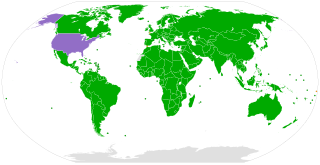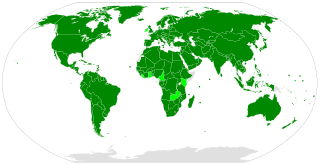
The United Nations Convention on the Rights of the Child is an international human rights treaty which sets out the civil, political, economic, social, health and cultural rights of children. The convention defines a child as any human being under the age of eighteen, unless the age of majority is attained earlier under national legislation.
The Children's Rights Movement is a historical and modern movement committed to the acknowledgment, expansion, and/or regression of the rights of children around the world. This act laid several constitutional laws for the growth of a child's mental and physical health.. It began in the early part of the last century and has been an effort by government organizations, advocacy groups, academics, lawyers, lawmakers, and judges to construct a system of laws and policies that enhance and protect the lives of children. While the historical definition of child has varied, the United Nations Convention on the Rights of the Child asserts that "A child is any human being below the age of eighteen years, unless under the law applicable to the child, majority is attained earlier." There are no definitions of other terms used to describe young people such as "adolescents", "teenagers" or "youth" in international law.
Children's rights or the rights of children are a subset of human rights with particular attention to the rights of special protection and care afforded to minors. The 1989 Convention on the Rights of the Child (CRC) defines a child as "any human being below the age of eighteen years, unless under the law applicable to the child, majority is attained earlier." Children's rights includes their right to association with both parents, human identity as well as the basic needs for physical protection, food, universal state-paid education, health care, and criminal laws appropriate for the age and development of the child, equal protection of the child's civil rights, and freedom from discrimination on the basis of the child's race, gender, sexual orientation, gender identity, national origin, religion, disability, color, ethnicity, or other characteristics.
Refugee law is the branch of international law which deals with the rights and duties states have vis-a-vis refugees. There are differences of opinion among international law scholars as to the relationship between refugee law and international human rights law or humanitarian law.

The Convention on the Elimination of all Forms of Discrimination Against Women (CEDAW) is an international treaty adopted in 1979 by the United Nations General Assembly. Described as an international bill of rights for women, it was instituted on 3 September 1981 and has been ratified by 189 states. Over fifty countries that have ratified the convention have done so subject to certain declarations, reservations, and objections, including 38 countries who rejected the enforcement article 29, which addresses means of settlement for disputes concerning the interpretation or application of the convention. Australia's declaration noted the limitations on central government power resulting from its federal constitutional system. The United States and Palau have signed, but not ratified the treaty. The Holy See, Iran, Somalia, Sudan, and Tonga are not signatories to CEDAW.

The Optional Protocol to the Convention on the Rights of the Child on the Involvement of Children in Armed Conflict (OPAC), also known as the child soldier treaty, is a multilateral treaty whereby states agree to: 1) prohibit the conscription into the military of children under the age of 18; 2) ensure that military recruits are no younger than 16; and 3) prevent recruits aged 16 or 17 from taking a direct part in hostilities. The treaty also forbids non-state armed groups from recruiting anyone under the age of 18 for any purpose.

The Optional Protocol on the Sale of Children, Child Prostitution and Child Pornography is a protocol to the Convention on the Rights of the Child and requires parties to prohibit the sale of children, child prostitution and child pornography.

The Committee on the Rights of the Child (CRC) is a body of experts that monitor and report on the implementation of the United Nations Convention on the Rights of the Child.

The U.S. Department of State's Country Report on Human Rights Practices for São Tomé and Príncipe states that the government generally respects the human rights of its citizens, despite problems in a few areas.

Human rights in Somalia throughout the late 20th-century and early 21st-century were considered dire, but have gradually improved over the following years. Human rights are guaranteed in the Federal Constitution, which was adopted in August 2012. They fall under the Ministry of Human Rights established in August 2013. The central authorities concurrently inaugurated a National Human Rights Day, endorsed an official Human Rights Roadmap, and completed Somalia's first National Gender Policy.

The timeline of young peoples' rights in the United States, including children and youth rights, includes a variety of events ranging from youth activism to mass demonstrations. There is no "golden age" in the American children's rights movement.

The Convention on the Rights of Persons with Disabilities is an international human rights treaty of the United Nations intended to protect the rights and dignity of persons with disabilities. Parties to the convention are required to promote, protect, and ensure the full enjoyment of human rights by persons with disabilities and ensure that persons with disabilities enjoy full equality under the law. The Convention serves as a major catalyst in the global disability rights movement enabling a shift from viewing persons with disabilities as objects of charity, medical treatment and social protection towards viewing them as full and equal members of society, with human rights. The convention was the first U.N. human rights treaty of the twenty-first century.
The United States has signed the United Nations Convention on the Rights of the Child (UNCRC); however, it remains the only United Nations member state to have not ratified it.
Papua New Guinea (PNG) is a constitutional parliamentary democracy with an estimated population of 6,187,591. Police brutality, provincial power struggles, violence against women, and government corruption all contribute to the low awareness of basic human rights in the country.

Human rights in Sierra Leone are in a rather deplorable state, but have improved gradually since the end of its civil war in 2002. Among the major human-rights problems in Sierra Leone today, according to a 2011 U.S. State Department report, are "security force abuse and use of excessive force with detainees, including juveniles; harsh conditions in prisons and jails; official impunity; arbitrary arrest and detention; prolonged detention, excessive bail, and insufficient legal representation; interference with freedom of speech and press; forcible dispersion of demonstrators; widespread official corruption; societal discrimination and violence against women, discrimination based on sexual orientation; female genital mutilation (FGM); child abuse; trafficking in persons, including children; and forced child labor".

UNICEF Malaysia is one of over 190 national offices of the United Nations Children’s Fund. Since its establishment in 1954, UNICEF Malaysia has been on the ground to uphold the rights of children in Malaysia, including their right to an education, healthcare and protection from abuse and exploitation. It also advocates for political change in support of children, and works with partner organizations from the public, charity and private sectors, to effect change. It is a Malaysian affiliate of the UNICEF.
The rights of children living in New Zealand are secured through various pieces of legislation. These include the Children's Commissioner Act 2003, the Oranga Tamariki Act 1989, the Care of Children Act 2004, the Education Act 1989, the New Zealand Bill of Rights Act 1990, the Crimes Act 1961, the Human Rights Act 1993, the Privacy Act 1993, and the Official Information Act 1982. The laws and policies comply with the United Nations Convention on the Rights of the Child, which New Zealand ratified on 6 April 1993.
The terrorist group, self-proclaimed Islamic State (Islamic State of Iraq and Levant also known as Islamic State of Iraq and Syria has committed several fundamental violations of children's rights in the Middle East, particularly in Iraq and Syria The conventions protecting children's rights is the United Nations Convention on the Rights of the Child. This is the most ratified international human rights treaty in history which established the widely supported view that children and young persons have the same basic general human rights as adults and also specific rights that recognize their special needs. A further two additional protocols were adopted by the UN General Assembly on 25 May 2000 covering the involvement of children in armed conflict and on the sale of children, child prostitution and child pornography. In ISIL's rise in the recent years, they have committed various violations of the and its protocols, which have been signed and ratified by Iraq and Syria.
The Islamic Republic of Iran signed the UN Convention on the Rights of the Child (CRC) in 1991 and ratified it in 1994. Upon ratification, Iran made the following reservation: "If the text of the Convention is or becomes incompatible with the domestic laws and Islamic standards at any time or in any case, the Government of the Islamic Republic shall not abide by it."
Protection of children’s rights is guaranteed by the Constitution of the Republic of Azerbaijan and a number of other laws. Children’s rights embrace legal, social and other issues concerning children.










